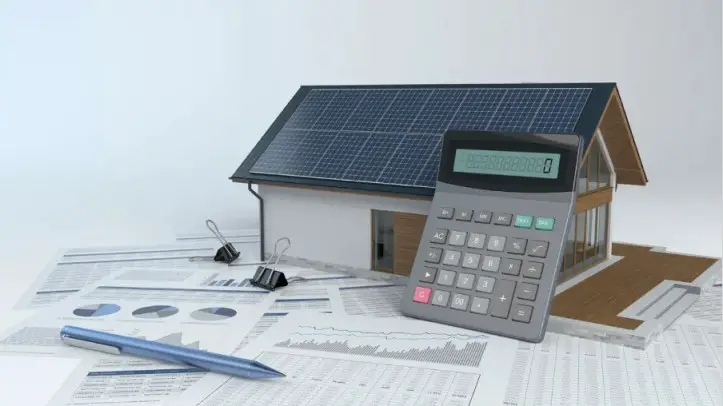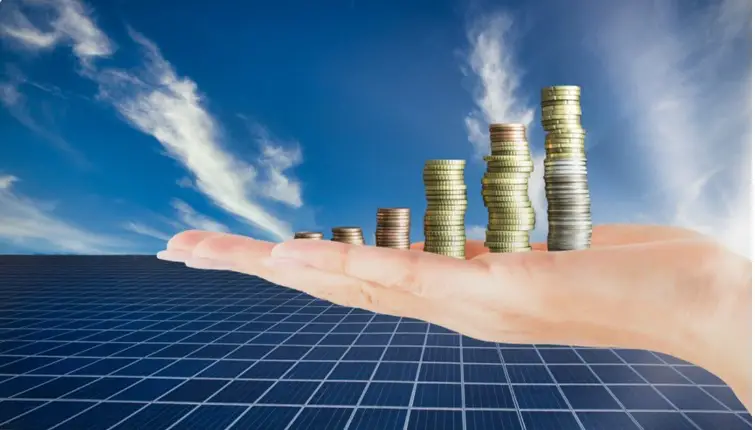
CommonCentsMom.com is advertiser-supported: we may earn compensation from the products and offers mentioned in this article. However, any expressed opinions are our own and aren't influenced by compensation. The contents of the CommonCentsMom.com website, such as text, graphics, images, and other material contained on this site (“Content”) are for informational purposes only. The Content is not intended to be a substitute for professional financial or legal advice. Always seek the advice of your Financial Advisor, CPA and Lawyer with any questions you may have regarding your situation. Never disregard professional advice or delay in seeking it because of something you have read on this website!
Solar panels become an important tool in the search for greener energy options at a time when environmental awareness and sustainability are rising to the top. Solar energy is becoming a major factor in economic gains and has moved past its reputation as an environmentally beneficial energy source as technology develops. In addition to examining the economic effect, the function of solar enterprises, and the computed benefits of solar electricity across various locations, this article explores the financial benefits of installing solar panels.
Understanding Solar Panels and Solar Companies
Often referred to as photovoltaic cells, solar panels are gadgets that use sunshine to create energy. The solar energy gathered by these panels is converted into a useful form by the use of linked solar cells. In addition to promoting a cleaner and more sustainable energy ecology, solar energy may power large cities as well as homes and businesses.
Solar companies significantly aid the development of solar energy. Developing, installing, and upkeep of solar panel systems is their area of expertise. Solar companies are constantly improving the price and efficiency of solar technology, emphasizing sustainability.
Solar Power Applications and Purposes
Solar energy has many uses. Solar panels for home is an adaptable and environmentally responsible option. Houses with solar panels rely less on conventional energy sources, resulting in cheaper utility costs and a smaller carbon imprint. In order to promote a greener and more sustainable economy, solar panels are also widely employed to power companies, educational institutions, and government buildings.

Source: Solar Power Systems
Calculating Solar Panel Wattage: A Financial Perspective
Comprehending the financial ramifications of solar panel adoption is crucial, especially when determining the wattage of the panels. A solar panel’s wattage directly affects how much electricity it can produce. Individuals and companies can determine the quantity and size of solar panels needed by computing the watts needed for certain energy demands.
Solar power calculator tools facilitate this process, providing a detailed analysis of energy consumption patterns and recommending the optimal solar panel configuration. This approach ensures that the investment in solar panels aligns with the actual energy needs, maximizing the financial benefits over the long term.
Solar Companies in Alaska and Iowa: Regional Perspectives
Using solar companies in Alaska and Iowa as examples, we can see that the financial benefits of using solar power differ by location. Solar panels provide the potential to lessen dependency on imported fossil fuels in Alaska, where sunshine is abundant during the summer months. For both residential and business users, solar power is a financially feasible solution since companies installing solar panels in the area support energy independence and cost savings.
Solar enterprises are an important part of the economy of Iowa, a state that is becoming more and more committed to renewable energy. Incentives from the state, tax breaks, and a pro-solar legislative climate propel the use of solar power in Iowa. This fosters an environment wherein homes and companies may engage in solar energy and gain both financially and environmentally.

Source: Solar Systems Reviews
The Economic Impact of Solar Energy
Solar energy has an economic influence that goes beyond the homes and businesses of specific individuals. Solar energy companies support economic development and employment creation. Skilled technicians, engineers, and support personnel are needed for the installation and upkeep of solar panels, creating job possibilities in the surrounding towns.
Furthermore, using solar electricity has financial benefits beyond short-term cost reductions. Businesses and governments that invest in solar energy help to build a more affordable and robust energy infrastructure by lowering their need for conventional, frequently unstable energy sources. Basically, installing solar panels combines environmental awareness with significant financial gains.
Advantages of Solar Power: A Comprehensive Overview
- Environmental Benefits: The generation of solar energy does not release greenhouse gasses like carbon dioxide into the atmosphere, nor does it contaminate water supplies.
- Financial Savings: Long-term cost savings associated with solar panels contribute to substantial financial benefits.
- Rapid ROI for Homeowners: Homeowners investing in solar energy often experience a swift return on investment, leading to increased property values and reduced monthly expenses.
- Increased Accessibility: Solar panels for sale are increasingly accessible, with various financing options available to make the transition more affordable.
- Incentives and Rebates: Federal and state incentives sweeten the deal, offering tax credits and rebates to individuals and businesses adopting sustainable energy practices.
Pros and Cons of Solar Energy: A Balanced Perspective
Pros of Solar Energy:
- Abundant and Renewable: Solar energy is abundant, renewable, and contributes significantly to reducing greenhouse gas emissions.
- Ongoing Innovation: Addressing challenges requires ongoing innovation within the solar industry.
- Commitment to Sustainability: A commitment to sustainable practices is crucial to mitigating the environmental impact and improving the overall viability of solar energy.
- Evolving Technology: As technology evolves, the disadvantages of solar energy are mitigated, making it an increasingly viable and economically attractive option.
Cons of Solar Energy:
- Intermittency: Solar energy’s dependence on sunlight introduces intermittency challenges.
- Installation Costs: Initial installation costs may pose a hurdle for some.
- Environmental Impact: The environmental impact of manufacturing solar panels warrants consideration.
Solar House Economic Modular Home: A Glimpse into the Future
The idea of a solar house economic modular home symbolizes how solar technology is woven into the residential architecture itself. Solar-powered modular houses are an excellent example of a cost-effective and environmentally friendly living arrangement. These dwellings establish a mutually beneficial connection with the larger energy infrastructure by producing their own energy and returning surplus energy to the grid.
Modular houses with solar panels provide financial benefits that go beyond lower power costs. The financial advantages for homeowners are further increased by the fact that these houses frequently qualify for extra tax breaks and refunds. Future residential development may be built around solar house economic modular homes as the desire for sustainable living alternatives increases.
Conclusion: Embracing the Economic Impact of Solar Energy
In conclusion, adopting solar panels transcends environmental benefits, offering substantial economic advantages. From calculating solar panel wattage to understanding the regional dynamics of solar companies in Iowa and Alaska, individuals and businesses can make informed decisions about transitioning to clean energy.
The economic benefits of solar energy include the development of jobs, decreased reliance on non-renewable resources, and long-term cost reductions. Solar panels are becoming more widely available and reasonably priced as technology develops, increasing the possibility of sustainable living and economic success for communities worldwide.
Those who take advantage of the benefits of solar power will control the energy of the future. Through comprehension of the financial ramifications, utilization of local prospects, and integration of solar technology into residential and commercial areas, humanity may create the foundation for a more environmentally conscious, economically prosperous, and cleaner future.






